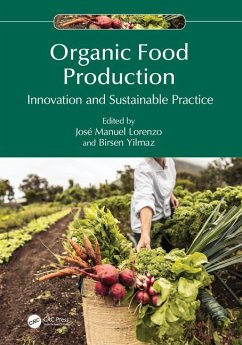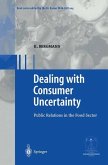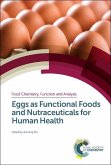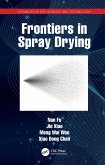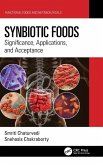Organic Food Production
Innovation and Sustainable Practice
Herausgeber: Lorenzo, José Manuel; Yilmaz, Birsen
Organic Food Production
Innovation and Sustainable Practice
Herausgeber: Lorenzo, José Manuel; Yilmaz, Birsen
- Gebundenes Buch
- Merkliste
- Auf die Merkliste
- Bewerten Bewerten
- Teilen
- Produkt teilen
- Produkterinnerung
- Produkterinnerung
This book provides comprehensive insights into various aspects of organic foods, including their production processes, certification procedures, regulatory frameworks, global market dynamics, and consumer preferences and acceptance.
Andere Kunden interessierten sich auch für
![Dealing with consumer uncertainty Dealing with consumer uncertainty]() Karin BergmannDealing with consumer uncertainty77,99 €
Karin BergmannDealing with consumer uncertainty77,99 €![Eggs as Functional Foods and Nutraceuticals for Human Health Eggs as Functional Foods and Nutraceuticals for Human Health]() Eggs as Functional Foods and Nutraceuticals for Human Health244,99 €
Eggs as Functional Foods and Nutraceuticals for Human Health244,99 €![Recent Advances in Ready-To-Eat Food Technology Recent Advances in Ready-To-Eat Food Technology]() Recent Advances in Ready-To-Eat Food Technology231,99 €
Recent Advances in Ready-To-Eat Food Technology231,99 €![Food Allergies Food Allergies]() Food Allergies228,99 €
Food Allergies228,99 €![Food Intolerances Food Intolerances]() Food Intolerances231,99 €
Food Intolerances231,99 €![Frontiers in Spray Drying Frontiers in Spray Drying]() Nan FuFrontiers in Spray Drying165,99 €
Nan FuFrontiers in Spray Drying165,99 €![Synbiotic Foods Synbiotic Foods]() Smriti ChaturvediSynbiotic Foods97,99 €
Smriti ChaturvediSynbiotic Foods97,99 €-
-
-
This book provides comprehensive insights into various aspects of organic foods, including their production processes, certification procedures, regulatory frameworks, global market dynamics, and consumer preferences and acceptance.
Hinweis: Dieser Artikel kann nur an eine deutsche Lieferadresse ausgeliefert werden.
Hinweis: Dieser Artikel kann nur an eine deutsche Lieferadresse ausgeliefert werden.
Produktdetails
- Produktdetails
- Verlag: CRC Press
- Seitenzahl: 242
- Erscheinungstermin: 16. Dezember 2024
- Englisch
- Abmessung: 254mm x 178mm x 16mm
- Gewicht: 662g
- ISBN-13: 9781032438177
- ISBN-10: 1032438177
- Artikelnr.: 70901059
- Herstellerkennzeichnung
- Libri GmbH
- Europaallee 1
- 36244 Bad Hersfeld
- gpsr@libri.de
- Verlag: CRC Press
- Seitenzahl: 242
- Erscheinungstermin: 16. Dezember 2024
- Englisch
- Abmessung: 254mm x 178mm x 16mm
- Gewicht: 662g
- ISBN-13: 9781032438177
- ISBN-10: 1032438177
- Artikelnr.: 70901059
- Herstellerkennzeichnung
- Libri GmbH
- Europaallee 1
- 36244 Bad Hersfeld
- gpsr@libri.de
José Manuel Lorenzo is Head of Research at the Meat Technology Centre of Galicia (CTC), Ourense, Spain and Associate Professor at the University of Vigo. He has a degree in Food Science and Technology from the University of Vigo (1995-2000). In 2005-2006 from October to March, he completed his training with a predoctoral stay at the Stazione Sperimentale per L¿Industria delle Conserve Alimentaria (Parma, Italy). He obtained his Ph.D. in Food Science and Technology (University of Vigo) in 2006. He has started his scientific career in the Department of Food Science and Technology at the University of Vigo, first as a researcher scholarship, then, since April 2006, as an academic researcher. In 2007 joined the CTC staff, developing since then an intense collaboration with the industrial sector, private companies, and research institutions as PI of several projects of R&D and innovation in the Food Science area, with an emphasis on Healthier and Functional Foods development. His desire to be continuously trained has led him to make two international stays for two months each at the University de São Paulo (Brazil) and the University of Bari (Italia) in 2016 and 2018, respectively. These stays allowed him to strengthen international relations for future collaborations in calls for European and International projects, as well as the cooperation in training programs for research and technical personnel. Nowadays, he leads a multidisciplinary team of researchers and technicians at CTC. His main research lines are (i) Reduction of additives in meat products; (ii) Development of new healthier meat products; (iii) Use of agri-food industries by-products as potential sources to obtain valuable and bioactive compounds; (iv) Use of emerging and green technologies (supercritical fluid extraction and pulsed electric fields) for the recovery of biologically active compounds from several plant matrices and by-products; (v) Incorporation of bioactive compounds and development of functional foods; and (vi) Use of active packaging to protect foods against oxidative degradation. Birsen Y¿lmaz works as Associate Professor with Cukurova University/Türkiye. She completed BSc (2013), MSc (2017) & PhD (2021) in the Department of Nutrition and Dietetics at Gazi University, Ankara. She has been working with national and international study groups since the beginning of her career, which has provided her with a wide network as well as great opportunities to learn and improve her skills. Her main motivation is to do science and keep learning. Her contributions so far have been related to various fields, but mostly associated with food chemistry (especially fermented foods), food science & human nutrition, organic foods, malnutrition, body composition and energy expenditure. She has many papers that have been published in mostly Q1 and Q2 journals. She has also respectable experience as a reviewer and editorial board member in national and international prestigious journals. Along with being an editorial board member, she is a reviewer in many international journals. Her research interests span a wide range of topics, with recent focus on sustainability diets, fermented foods, and the impact of different diet models on body composition and energy expenditure.
1. Organic Certification, Labeling, and Regulations in European Countries
2. Organic Certification, Labeling, and Regulations in the US and Canada 3.
Organic certification, Labeling, and Regulations in Africa 4. Recent Trends
in the Organic Food Global Industry 5. Why Do People Purchase Organic Food?
Motivational Factors Affecting Organic Food Purchases 6. Has COVID-19
Affected Consumer Behaviors and Expectations toward Organic Food? 7.
Organic vs. Conventional Foods: Comparison of Measurable Benefits on Health
8. Organic Foods vs. Conventional Foods: Concerns about Food Safety 9. Are
Organic Foods Better for the Environment? Comparison of Environmental Costs
of Organic and Conventional Foods 10. Is there an Invisible Part of the
Iceberg? Recent Studies Regarding the Cons of Organic Foods 11. Sustainable
Approaches to Organic Aquaculture and the Fishery Ecosystem 12. Organic and
Sustainable Beekeeping: Practice in the World 13. Organic Farming in
Africa: A Pillar of Innovation and Transformation to Promote the
Development of a Sustainable Agriculture Sector
2. Organic Certification, Labeling, and Regulations in the US and Canada 3.
Organic certification, Labeling, and Regulations in Africa 4. Recent Trends
in the Organic Food Global Industry 5. Why Do People Purchase Organic Food?
Motivational Factors Affecting Organic Food Purchases 6. Has COVID-19
Affected Consumer Behaviors and Expectations toward Organic Food? 7.
Organic vs. Conventional Foods: Comparison of Measurable Benefits on Health
8. Organic Foods vs. Conventional Foods: Concerns about Food Safety 9. Are
Organic Foods Better for the Environment? Comparison of Environmental Costs
of Organic and Conventional Foods 10. Is there an Invisible Part of the
Iceberg? Recent Studies Regarding the Cons of Organic Foods 11. Sustainable
Approaches to Organic Aquaculture and the Fishery Ecosystem 12. Organic and
Sustainable Beekeeping: Practice in the World 13. Organic Farming in
Africa: A Pillar of Innovation and Transformation to Promote the
Development of a Sustainable Agriculture Sector
1. Organic Certification, Labeling, and Regulations in European Countries
2. Organic Certification, Labeling, and Regulations in the US and Canada 3.
Organic certification, Labeling, and Regulations in Africa 4. Recent Trends
in the Organic Food Global Industry 5. Why Do People Purchase Organic Food?
Motivational Factors Affecting Organic Food Purchases 6. Has COVID-19
Affected Consumer Behaviors and Expectations toward Organic Food? 7.
Organic vs. Conventional Foods: Comparison of Measurable Benefits on Health
8. Organic Foods vs. Conventional Foods: Concerns about Food Safety 9. Are
Organic Foods Better for the Environment? Comparison of Environmental Costs
of Organic and Conventional Foods 10. Is there an Invisible Part of the
Iceberg? Recent Studies Regarding the Cons of Organic Foods 11. Sustainable
Approaches to Organic Aquaculture and the Fishery Ecosystem 12. Organic and
Sustainable Beekeeping: Practice in the World 13. Organic Farming in
Africa: A Pillar of Innovation and Transformation to Promote the
Development of a Sustainable Agriculture Sector
2. Organic Certification, Labeling, and Regulations in the US and Canada 3.
Organic certification, Labeling, and Regulations in Africa 4. Recent Trends
in the Organic Food Global Industry 5. Why Do People Purchase Organic Food?
Motivational Factors Affecting Organic Food Purchases 6. Has COVID-19
Affected Consumer Behaviors and Expectations toward Organic Food? 7.
Organic vs. Conventional Foods: Comparison of Measurable Benefits on Health
8. Organic Foods vs. Conventional Foods: Concerns about Food Safety 9. Are
Organic Foods Better for the Environment? Comparison of Environmental Costs
of Organic and Conventional Foods 10. Is there an Invisible Part of the
Iceberg? Recent Studies Regarding the Cons of Organic Foods 11. Sustainable
Approaches to Organic Aquaculture and the Fishery Ecosystem 12. Organic and
Sustainable Beekeeping: Practice in the World 13. Organic Farming in
Africa: A Pillar of Innovation and Transformation to Promote the
Development of a Sustainable Agriculture Sector

